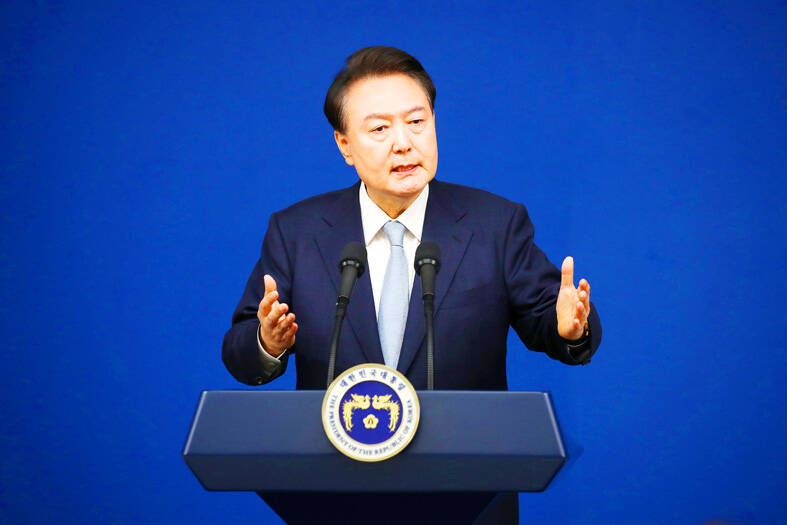South Korean President Yoon Suk-yeol yesterday pledged to reform the country’s multibillion-dollar pension scheme, as a looming demographic crisis threatens to upend the payment system’s stability.
South Korea has the world’s lowest birthrate and a rapidly aging population. The number of children a woman is expected to have in her lifetime dropped to 0.72 last year, far below the so-called replacement rate needed to keep a population stable.
The country’s pension fund is the world’s third-largest, but with insufficient new contributors due to the demographic crisis, the fund is expected to deplete rapidly.

Photo: EPA-EFE
“We need to fundamentally reform the current pension system, which works poorly for the elderly and has not got the trust of the youth,” Yoon said at a policy briefing.
South Korea’s pension fund is valued at more than 1,113.5 trillion won (US$837.5 billion), but projections by the government indicate that the fund’s growth would cease by 2041, and it is anticipated to be depleted by 2055.
This is largely because eligibility for full pension benefits was rare in the past, but since then, those able to receive pensions more easily — baby boomers — are beginning to retire after a lifetime of contributions.
The reforms would aim to create a sustainable system providing “intergenerational fairness and income security after retirement” to “restore trust in the National Pension Service,” Yoon said.
About two-fifths of South Koreans in their 20s and 30s said the pension system needs to be reformed “to ensure that I can receive a pension in the future,” a recent poll showed.
Yoon said he would push for reforms acceptable to the young generation who “pay the longest, pay the highest premium, and are the last to receive a pension.”
He also announced plans to extend credit benefits to people who have children or complete military service, so “there is no gap in the pension subscription period.”

The Burmese junta has said that detained former leader Aung San Suu Kyi is “in good health,” a day after her son said he has received little information about the 80-year-old’s condition and fears she could die without him knowing. In an interview in Tokyo earlier this week, Kim Aris said he had not heard from his mother in years and believes she is being held incommunicado in the capital, Naypyidaw. Aung San Suu Kyi, a Nobel Peace Prize laureate, was detained after a 2021 military coup that ousted her elected civilian government and sparked a civil war. She is serving a

REVENGE: Trump said he had the support of the Syrian government for the strikes, which took place in response to an Islamic State attack on US soldiers last week The US launched large-scale airstrikes on more than 70 targets across Syria, the Pentagon said on Friday, fulfilling US President Donald Trump’s vow to strike back after the killing of two US soldiers. “This is not the beginning of a war — it is a declaration of vengeance,” US Secretary of Defense Pete Hegseth wrote on social media. “Today, we hunted and we killed our enemies. Lots of them. And we will continue.” The US Central Command said that fighter jets, attack helicopters and artillery targeted ISIS infrastructure and weapon sites. “All terrorists who are evil enough to attack Americans are hereby warned

Seven wild Asiatic elephants were killed and a calf was injured when a high-speed passenger train collided with a herd crossing the tracks in India’s northeastern state of Assam early yesterday, local authorities said. The train driver spotted the herd of about 100 elephants and used the emergency brakes, but the train still hit some of the animals, Indian Railways spokesman Kapinjal Kishore Sharma told reporters. Five train coaches and the engine derailed following the impact, but there were no human casualties, Sharma said. Veterinarians carried out autopsies on the dead elephants, which were to be buried later in the day. The accident site

‘EAST SHIELD’: State-run Belma said it would produce up to 6 million mines to lay along Poland’s 800km eastern border, and sell excess to nations bordering Russia and Belarus Poland has decided to start producing anti-personnel mines for the first time since the Cold War, and plans to deploy them along its eastern border and might export them to Ukraine, the deputy defense minister said. Joining a broader regional shift that has seen almost all European countries bordering Russia, with the exception of Norway, announce plans to quit the global treaty banning such weapons, Poland wants to use anti-personnel mines to beef up its borders with Belarus and Russia. “We are interested in large quantities as soon as possible,” Deputy Minister of National Defense Pawel Zalewski said. The mines would be part